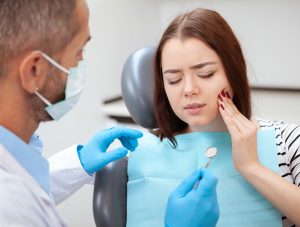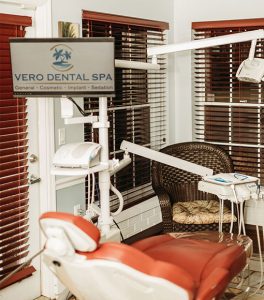How Temporomandibular Joint Disorders Develop
Temporomandibular joint disorder, or TMD, commonly affects jaw joints and muscles. While the exact causes of TMD aren’t always clear, several risk factors and preventive measures can help reduce the risk of developing this condition.
If you’re experiencing temporomandibular joint disorder symptoms contact our Vero Beach dental practice today by calling (772) 778-5550 to set up a TMJ consultation.
What Is TMJ Disorder?
The temporomandibular joints connect the lower jaw (mandible) to the skull, playing a critical role in jaw movement. TMJ disorder refers to a group of conditions that cause pain and dysfunction in these jaw joints and the surrounding muscles
Common Causes of TMJ Disorders
Jaw Injury or Trauma
A direct blow or injury to the jaw, head, or neck can lead to TMJ disorder. Such trauma can damage the joint or the muscles controlling jaw movement, resulting in pain and dysfunction.
- Car Accidents: Whiplash or other injuries from car accidents can strain the jaw muscles and joints.
- Sports Injuries: Contact sports or activities that involve physical impact can also contribute to TMJ problems.
- Falls: Falling and landing on your jaw or head can cause significant trauma to the TMJ.
Arthritis
Arthritis, particularly osteoarthritis and rheumatoid arthritis, can affect the TMJ, leading to inflammation and pain.
- Osteoarthritis: This degenerative joint disease causes the cartilage in the TMJ to wear down over time, leading to pain and reduced mobility.
- Rheumatoid Arthritis: An autoimmune condition that causes inflammation of the joints, including the TMJ.
Bruxism (Teeth Grinding and Clenching)
Bruxism, the habitual grinding or clenching of teeth, is a significant cause of TMJ disorder. This condition can put excessive pressure on the jaw muscles and joints, leading to pain and discomfort.
- Stress and Anxiety: Emotional stress often leads to bruxism, especially during sleep.
- Malocclusion: An improper bite can cause uneven pressure on the TMJ, contributing to bruxism.
Jaw Misalignment (Malocclusion)
Jaw misalignment, or malocclusion, occurs when the teeth do not fit together correctly. This can cause the jaw to move improperly, leading to strain on the TMJ.
- Overbite/Underbite: Conditions where the upper or lower teeth protrude excessively can lead to TMJ problems.
- Crossbite: When the upper teeth bite inside the lower teeth, it can cause jaw misalignment and TMJ issues.
Stress and Emotional Factors
Stress is a common contributor to TMJ disorder. High stress levels can lead to muscle tension in the jaw, neck, and shoulders, exacerbating TMJ symptoms.
- Muscle Tension: Stress can cause the muscles controlling the jaw to become tense, leading to pain and discomfort.
- Teeth Clenching: As mentioned earlier, stress-induced bruxism can place additional strain on the TMJ.
Genetic Factors
Some individuals may be genetically predisposed to developing TMJ disorder. A family history of TMJ issues or related conditions can increase the likelihood of experiencing this disorder.
- Joint Hyperlaxity: Some people have joints that are more flexible or prone to dislocation, which can contribute to TMJ problems.
- Inherited Structural Abnormalities: Genetic factors may lead to structural abnormalities in the jaw or TMJ, increasing the risk of disorder.
Hormonal Changes
Hormonal fluctuations, particularly in women, have been linked to TMJ disorder. Estrogen may play a role in joint inflammation and pain.
- Menstrual Cycle: Some women experience worsened TMJ symptoms during their menstrual cycle due to hormonal changes.
- Pregnancy: Hormonal shifts during pregnancy can also contribute to TMJ issues.
Poor Posture
Poor posture, especially in the neck and upper back, can lead to TMJ disorder. Slouching or holding the head forward for extended periods can strain the jaw muscles and joints.
- Forward Head Posture: This posture puts undue stress on the neck and jaw, leading to TMJ symptoms.
- Text Neck: Constantly looking down at smartphones or computers can contribute to poor posture and TMJ problems.
Habits and Lifestyle Factors
Certain habits and lifestyle factors can increase the risk of developing TMJ disorder.
- Chewing Gum Excessively: Constant gum chewing can overwork the jaw muscles, leading to strain and discomfort.
- Nail Biting: This habit can cause uneven pressure on the jaw, contributing to TMJ issues.
- Smoking: Smoking can lead to inflammation and reduced blood flow to the TMJ, exacerbating symptoms.
TMJ Disorder Risk Factors
Common TMD risk factors include:
- Gender: Women are more likely to develop TMJ disorders than men, possibly due to hormonal differences and increased prevalence of conditions such as fibromyalgia and chronic fatigue syndrome.
- Sleep Disorders: Conditions like sleep apnea and snoring can disrupt sleep patterns and lead to jaw clenching or bruxism during sleep, increasing the risk of TMJ disorders.
- Age: TMJ disorders are most common in individuals between the ages of 20 and 40, although they can develop at any age.
- Genetics: There may be a genetic component to TMJ disorders, as some individuals may inherit a predisposition to this condition.
- Poor Posture: Poor posture can strain the neck and jaw muscles, leading to TMJ disorders.
When It’s Time to See the Doctor
If you’re at risk for developing a TMJ disorder and regularly experience symptoms, you should consult with a healthcare professional for an accurate diagnosis and appropriate treatment plan.
Symptoms that may indicate it’s time to see the doctor, include:
- Persistent Jaw Pain: If you’re experiencing persistent pain in the jaw, face, or ears, it may be a sign of a temporomandibular joint disorder. Severe pain that interferes with daily activities or doesn’t improve with self-care measures should prompt a visit to the doctor.
- Limited Jaw Movement: If you’re having difficulty opening or closing your mouth, or if your jaw feels stiff or locked, it may be a sign of a TMJ disorder.
- Clicking or Popping Sounds: If you hear clicking, popping, or grinding sounds when you open or close your mouth, it may indicate a TMJ disorder. While some people may experience these sounds without any associated pain or discomfort, they can also be a sign of joint dysfunction.
- Changes in Bite: If your bite feels off or your teeth don’t seem to fit together, it may point to TMD.
- Headaches: Headaches, particularly those in the temples or around the eyes, can indicate temporomandibular joint disorders.
Treatment Options for TMJ Disorder
Treatment for TMJ disorder varies depending on the underlying cause and severity of the condition. Common treatment options include:
- Medications: Over-the-counter pain relievers, anti-inflammatory drugs, or muscle relaxants may be prescribed.
- Physical Therapy: Exercises and therapies to strengthen the jaw muscles and improve flexibility.
- Occlusal Splints: Custom-made mouthguards to prevent teeth grinding and reduce strain on the TMJ.
- Stress Management: Techniques such as relaxation exercises, counseling, or biofeedback to manage stress-related bruxism.
- Surgical Options: In severe cases, surgery may be recommended to repair or replace the TMJ.
Frequently Asked Questions
Can TMJ disorders be prevented?
Yes, there are some steps you can take to prevent TMD. While TMJ disorders cannot always be prevented, several preventive measures can reduce the risk of developing this condition. These include practicing good oral hygiene, avoiding hard and chewy foods, managing stress, and maintaining good posture.
Who is most likely to get a TMJ disorder?
Anyone can develop a TMJ disorder, but women between the ages of 18 to 44 are more likely to experience this condition. Additionally, those with a history of arthritis or other joint problems may be at a higher risk of developing TMJ. Consult your doctor if you believe you have the beginning symptoms of TMD.
Does TMJ develop suddenly?
It depends. TMJ can develop suddenly, but it can also develop gradually over time. Some people may experience mild symptoms that worsen over time, while others may experience a sudden onset of severe symptoms.
What does the beginning of TMJ feel like?
The beginning of TMJ can feel like tenderness or pain in the jaw, particularly when chewing or speaking. Some people may have facial pain and also experience a clicking or popping sound when moving their jaw. As TMJ progresses, the pain may become more severe, and other symptoms, such as headaches and ear pain may also develop.
Determine the Root Cause of TMD and Seek Treatment
If you’re experiencing symptoms of TMD, such as pain or tenderness in the jaw, difficulty opening or closing the mouth, or clicking or popping sounds when moving the jaw, contact Vero Dental Spa. They can provide an accurate diagnosis and recommend an appropriate treatment plan to help alleviate your symptoms and improve your quality of life.
Call our dentist in Vero Beach at (772) 778-5550 to schedule a complimentary consultation today.

Get Your Complimentary
Consultation or 2nd Opinion
- Exam
- Full mouth X-ray
- Private Consultation with Doctor ($350 value)
- 3036 20th St,
Vero Beach, FL 32960 - (772) 778-5550
Working hours
- Monday: 8am - 5pm
- Tuesday: 8am - 5pm
- Wednesday: 8am - 5pm
- Thursday: 8am - 5pm
- Friday: 8am - 1pm
- Saturday & Sunday: Closed



